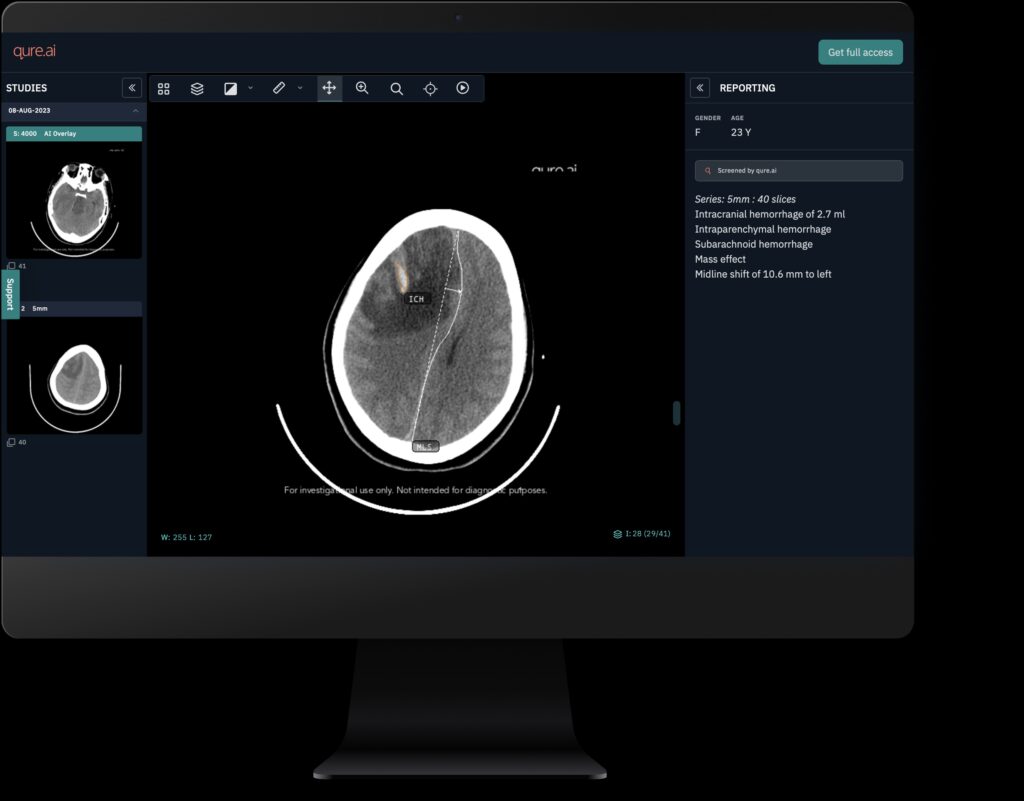Artificial intelligence is being used in a trial in Glasgow to help clinicians analyse head injury and brain scans and reduce waiting times in A&E.
The AI tool, developed by Qure.ai, will allow emergency department consultants and clinicians to make faster decisions about the care and discharge of patients requiring head CT scans.
The AI technology quickly examines head CT scans and accurately pinpoints critical areas of concern, creating prioritised reporting for radiology staff.
With the integration of AI at the Queen Elizabeth University Hospital, medical professionals are able to rapidly review reported CT scans resulting in prompt diagnosis and treatment decisions for patients who may be in a critical condition. It is one of four centres across the UK where the technology is being trialled.
In the first few weeks of the head CT AI implementation over the 2023/24 winter period, the AI technology analysed 651 non-contrast head CTs, detecting 128 head injuries including cranial fractures, intracranial haemorrhage (ICH), mass effect and mid-line shift within the brain.
Professor David Lowe, emergency medicine consultant at NHS Greater Glasgow and Clyde, said: “Emergency Departments across the country continue to face challenges with one person presenting at a UK emergency department (ED) every 90 seconds, potentially requiring brain imaging.
“By utilising the opportunities of innovative AI to help prioritise urgent cases, we will look to deliver critical interventions whilst improving workflow and time in the ED for patients with normal scans.
“The study looks to provide evidence to support adoption of AI across four centres in the UK. We hope this will support clinical teams in decision-making to deliver critical clinical care, reassurance and, when appropriate discharge releasing capacity and space for patients in our pressured system.”
The project called ACcEPT (Assess the Clinical Effectiveness in Prioritising CT Heads), commenced at the QEUH and is one of four planned NHS sites across the UK, utilising the head CT AI solution from Qure.
Denise Brown, director of digital services at NHS Greater Glasgow and Clyde, said: “It is important to establish reliable evidence on the impact and value of AI solutions, and to determine how they best support clinical decision making.
“Our Digital Strategy’s Enabled by AI Programme brings together NHS Greater Glasgow & Clyde’s expertise on research, innovation and the operation of AI solutions at scale, while working closely with colleagues in academia.”
Darren Stephens, senior vice president & commercial Head, UK and Europe at Qure.ai, said: “This is an exciting step forward for AI in NHS emergency departments. Providing digital health tools that can create calm and give informed prioritisation of urgent cases to support stretched clinical teams, especially at night or weekends, is very advantageous. It may help reduce CT scan-to-reporting turnaround times and give rapid alerts of critical findings that will boost the speed of treatment given to patients.”
